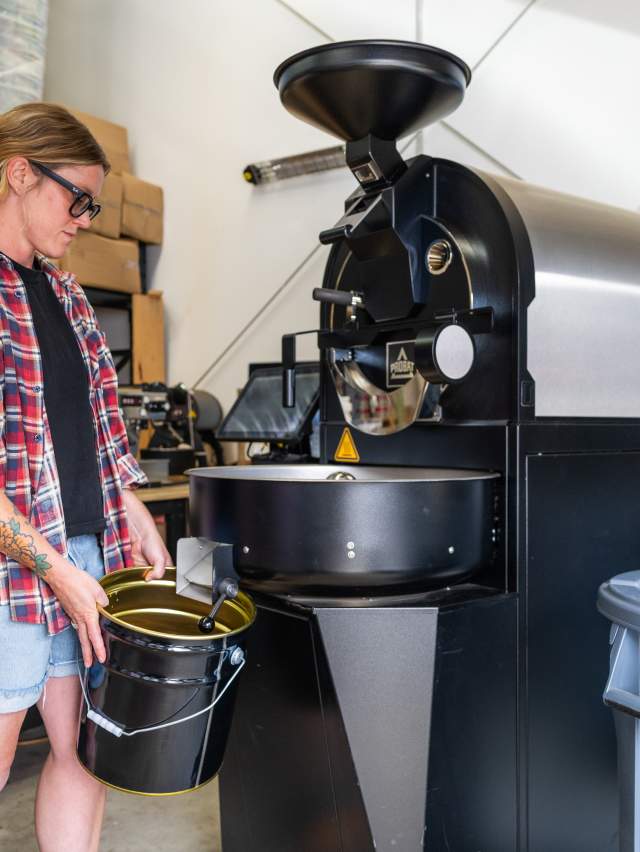Founded in 2021 by three young entrepreneurs, Ryder Specialty Coffee is a local Queenstown coffee roastery creating a better coffee experience through local connections, and a focus on sustainability.
The trio came together in an unexpected way when Wes McAllister, Ryder Managing Director, was recruiting for a new role at his other business, Crimson Badger Brewing. Sam Bright, now Ryder's Master Roaster, Relationship Manager and Founder, applied for the position.
The pandemic arrived shortly after, so the opportunity didn’t work out, but the pair stayed in touch. Sam had always wanted to start a coffee business, and after chatting with Wes over a coffee one day, the idea of Ryder Specialty Coffee was born.
The final piece of the puzzle was Pete Forde, who’d known Wes for almost a decade and is now Business Development and Sales Manager.
“We lived and worked together in Queenstown, so I knew he’d be a great person to team up with to really make this new business something special,” Wes says.

The Roasting Revolution
Sustainability isn’t just a buzzword for Ryder, it’s the foundation of the business. As the first coffee company in New Zealand to own a commercial electric coffee roaster, Ryder is setting a new standard for sustainable coffee roasting and embracing innovative technology.
“The roaster is powered entirely by electricity and steps away from the traditional gas-powered systems used widely across the industry,” Wes explains.
But the Probat P05e coffee roaster wasn’t chosen on a whim. Sourcing the technology was a meticulous process. Sam, a professional roaster with more than 15 years experience in the specialty coffee industry, recounts the challenges of selecting the roaster.
“It’s very new technology so initially I was sceptical. It took three to four months of thorough research and connecting with roasters around the world before we decided.” Sam says.
The Probat P05e is an electric version of Probat's renowned P05 model, designed for small to medium-scale operations like Ryder. With a roasting capacity of approximately 17 kilograms of roasted coffee per hour, its heating is entirely electric, providing precise temperature control, eliminating the need for gas.
Sam adds, “The consistency provided through electricity is amazing. It offers a level of control that gas powered systems just can’t match."

The whole package
Ryder’s sustainable ethos extends beyond the roasting process. The team has made a conscious effort to ensure every aspect, from roasting to packaging and coffee delivery, aligns with the company’s values.
In an industry where coffee typically arrives in plastic bags from all corners of the globe, Ryder has gone above and beyond. They opt for home compostable materials, including labels — an effort not many in the industry are undertaking.
Pete adds, “We’ve researched and tested everything from cups and lids to labels, ensuring that every item can be composted at home, not just in industrial composting systems.”
Ryder works with Decent Packaging, a company that shares a commitment to sustainability. The result is a packaging solution made from sugarcane byproducts, durable enough to handle hot coffee while still being compostable.
“It was really important to find something that didn’t fall apart as soon as you took the first sip. The products we use are strong, durable, and truly compostable,” Pete says.
Local community at the core
As a small coffee roastery in the heart of the Queenstown Lakes region, local relationships are key.
In 2024, Ryder attended Electrify Queenstown, joined by more than 150 other local business owners, an event which focused on sharing tools and knowledge needed to electrify, decarbonise and save money. It was there Wes heard from experts in electrification and was connected with a local banker who helped secure a low rate loan to purchase an electric forklift for the yard.
Partnering with local retailers has been an important part of Ryder’s journey. McKibbons of Royalburn, a local Queenstown grocer, has supported Ryder from the start alongside products from New Zealand’s top artisans and local growers. Other partnerships include Postmasters Cafe in Arrowtown and Sanger’s Pies in Cromwell, where Ryder’s beans are enjoyed alongside freshly baked pies.
With global challenges like climate change and shifts in the US dollar driving grain prices up, Ryder looks for ways to work with local companies to manage the impacts and find solutions together.
“It’s about building a network of businesses with similar values. We’re always keen to share where we source our tins from or the best suppliers for packaging. It’s not about competing—it’s about supporting each other,” says Pete.
Ryder’s community-minded approach extends to their customers as well. Ryder encourages locals to bring in reusable containers when buying coffee directly from the roastery.
“If you bring your own container, we’ll give you coffee without any packaging, and it will be just as fresh as if you’d bought it in a bag,” Pete says.
This kind of thinking encourages customers to take responsibility for their part.
A better way forward
In a world where convenience often trumps sustainability, Ryder is proving it’s possible to have both: high-quality, exceptionally tasting coffee with minimal environmental impact.
The challenges are real, and the journey is ongoing. From sourcing compostable materials to building strong local partnerships, Ryder continues to push for what it means to brew the perfect cup.
With plans underway to open an espresso bar at its Frankton premises in 2025, retail customers in Queenstown will soon have the opportunity to fully experience a coffee movement that puts people and planet first.


